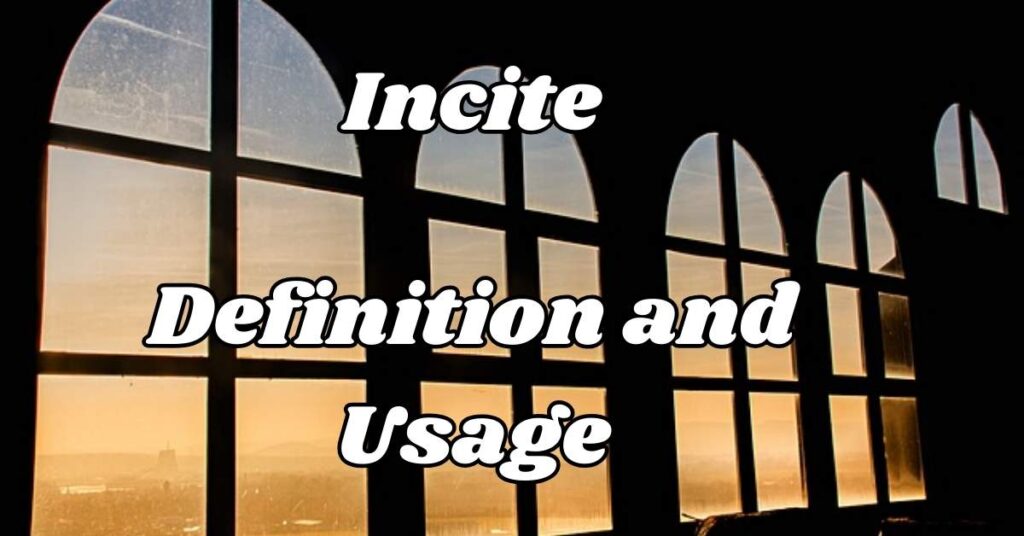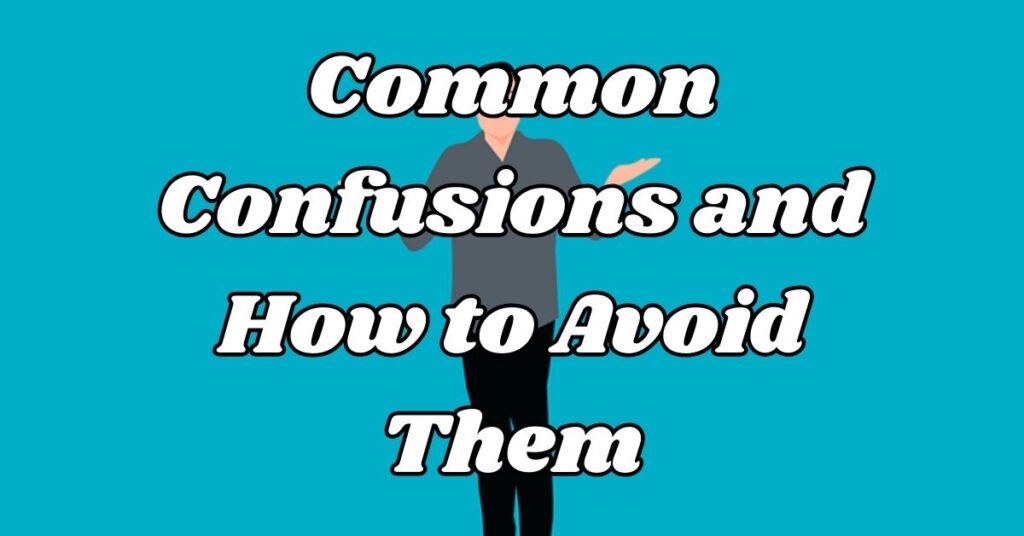Incite Or Insight can significantly influence how we communicate and understand the world around us. While these two terms may sound similar, their meanings diverge in important ways.
Incite refers to provoking or stirring up action, often with a negative connotation, whereas insight embodies a deep understanding or perception of a situation. Misusing these words can lead to confusion in both spoken and written communication, affecting linguistic accuracy and clarity.
By exploring the distinctions between incite vs insight, we can enhance our communication skills and avoid common pitfalls that arise from their phonetic similarity. Let’s delve deeper into their definitions, origins, and practical applications.
Quick Summary
Understanding the difference between incite vs insight is essential for effective communication. While incite means to provoke or stir up action, often with negative implications, insight refers to a deep understanding or clarity about a situation.
Misusing these terms can lead to confusion in both writing and conversation. By grasping their distinct meanings, you can enhance your language skills and express yourself more clearly in various contexts.
Understanding Incite Or Insight

Incite and insight may sound alike, but their meanings are entirely different. Incite means to provoke or stir up action, often with a negative tone, like inciting anger or unrest. On the other hand, insight refers to a deep understanding or realization about something.
Knowing the distinction between these words is essential for avoiding confusion and improving your communication skills in both casual and formal settings.
Origins of the Incite
The word incite dates back to the mid-15th century, originating from the Old French term inciter, meaning “to stir up” or “excite.” This, in turn, comes from the Latin incitare, which means “to put into rapid motion” or “to urge.”
The root components include in- meaning “into” and citare, which means “to move” or “excite.”
Origins of the Insight
The term insight originated around 1200 as innsihht, meaning “sight with the ‘eyes’ of the mind” or mental understanding. It combines the prefix in- with sight. Over time, its meaning evolved to signify a “penetrating understanding” of character or hidden nature, particularly by the 1580s. Similar words exist in Dutch (inzigt), German (einsicht), and Danish (indsigt).
Incite: Definition and Usage

Incite is a verb that means to provoke, stir up, or encourage someone to take action, often in a way that leads to conflict or unrest. It is commonly associated with negative outcomes, such as inciting violence or anger.
For example, a speech may incite a crowd to protest. Understanding its usage helps ensure clarity in communication, especially in formal or professional contexts where precision matters.
Incite Meanings
Incite primarily means to provoke or stir up action, often in a harmful or violent manner. It can refer to encouraging someone to act aggressively, such as inciting a crowd to riot or inciting hatred through inflammatory speech.
The word carries negative connotations, as it typically involves urging others toward undesirable behaviors. Understanding these meanings is crucial for precise communication, especially in contexts involving social issues or public discourse.
Usage in Literature and Media
In literature and media, the term incite often appears in the context of pivotal moments that provoke significant actions or reactions. For instance, an inciting incident is a crucial event that disrupts the status quo and propels the protagonist into the main conflict of a story.
Classic examples include the shark attack in Jaws or the plane crash in Lord of the Flies, both of which incite tension and drive the narrative forward. Understanding how incite is used in these contexts can enhance our appreciation for storytelling techniques and the emotional impact they create.
Synonyms of Incite
Here are a few synonyms for the word incite:
- Provoke
- Encourage
- Instigate
- Stir up
- Urge
- Foment
- Inflame
- Stimulate
- Spur
- Rouse
Insight: Definition and Usage

Insight is a noun that refers to a deep understanding or clear perception of a complex issue or situation. It involves the ability to grasp underlying meanings and recognize patterns that may not be immediately obvious.
For example, gaining insight into human behavior can enhance interpersonal relationships. This term is widely used in various fields, including psychology, business, and education, where understanding nuances is essential for effective decision-making and problem-solving.
Insight Meanings
Insight refers to a deep, clear understanding of a complex situation or problem. It can involve recognizing hidden truths, patterns, or motivations that are not immediately obvious. Derived from the prefix in- and the word sight, it literally means “seeing inward.”
Often associated with intuition or mental clarity, insight allows individuals to grasp the essence of situations, making it invaluable in fields like psychology, business, and education.
Usage in Literature and Media
Insight plays a crucial role in conveying deeper meanings and themes. Authors often use characters’ insights to reveal their motivations or to highlight critical issues within society. For example, a novel may provide profound insights into human nature, prompting readers to reflect on their own lives.
Similarly, documentaries can offer insights into complex topics, enhancing viewers’ understanding of the world. By employing insight, creators can engage audiences more effectively, encouraging them to think critically about the content presented.
Synonyms of Insight
Here are a few synonyms for the word insight:
- Understanding
- Perception
- Awareness
- Discernment
- Comprehension
- Intuition
- Acumen
- Realization
- Wisdom
- Knowledge
Side by Side Comparison
| Feature | Incite | Insight |
| Part of Speech | Verb | Noun |
| Meaning | To provoke or stir up | A deep understanding |
| Connotation | Often negative | Generally positive |
Everyday Usage Examples

In everyday conversation and writing, using these terms correctly can enhance clarity. For example: When someone says they want to incite change within their community during a meeting, they mean they want to provoke action among members present.
In contrast, if someone shares an insight about improving team dynamics at work during a discussion, they are providing valuable understanding that could lead to better collaboration.
Incite Example
- The speaker aimed to incite passion among the crowd.
- His comments could incite unrest in the community.
- The protest was meant to incite change within the system.
Incite Example in a Political Rally
During political rallies:
- Politicians often incite emotions to rally support.
- The leader’s speech incited the audience to take action.
- Calls to incite reform echoed throughout the venue.
Incite Example in a Business Meeting
In business meetings:
- The manager tried to incite enthusiasm for the new project.
- Discussions that incite innovation can lead to breakthroughs.
- Strategies that incite competition can drive performance.
Incite Example in an Online Discussion
In online discussions:
- Posts that incite debate often go viral on social media.
- Comments designed to incite anger can escalate conflicts online.
- Articles that incite discussion are popular among readers.
Insight Example
- Her insights into market trends helped shape the strategy.
- Gaining insight into customer behavior is crucial for success.
- The research provided valuable insights into health issues.
Insight Example in a Political Rally
During political rallies:
- The speaker shared insights about voter concerns.
- Insights from experts guided policy decisions at the rally.
- Attendees gained insights into national issues through discussions.
Insight Example in a Business Meeting
In business meetings:
- Team members offered insights that improved project outcomes.
- Insights into competition can enhance strategic planning.
- The analysis provided critical insights for future initiatives.
Insight Example in an Online Discussion
In online discussions:
- Users shared insights that enriched the conversation on forums.
- Blogs often offer insights into current trends and events.
- Videos that provide insights tend to attract more viewers.
Common Confusions and How to Avoid Them

Many people often confuse incite and insight, leading to misunderstandings in communication. To avoid this, it is crucial to remember that incite means to provoke or stir up action, typically in a negative context, while insight refers to a deep understanding of a situation.
One effective way to prevent confusion is by practicing their usage in sentences and contexts. Additionally, being aware of the distinct meanings can enhance your communication skills, ensuring clarity in both writing and conversation.
Engaging in discussions about these terms can further solidify your understanding, helping you articulate your thoughts more accurately.
More Article: Afterwards or Afterward: How to Choose the Right Word
FAQs: Incite Or Insight
Is it incite or insight?
It is incite when referring to provoking action, and insight when discussing deep understanding.
What is the difference between inciting and insighting?
Inciting refers to provoking action, while insighting is not a standard term; the correct usage is simply insight.
Is incite always negative?
While incite often carries negative connotations, it can also refer to encouraging positive action, depending on context.
Is insight into grammatically correct?
Yes, the phrase insight into is grammatically correct and commonly used to describe understanding of a particular subject.
What word can best replace the word insight?
A suitable replacement for insight could be understanding, as it conveys a similar sense of comprehension.
Conclusion
The difference between incite and insight is essential for effective communication. While incite refers to provoking action, often with negative implications, insight embodies a deep understanding of complex situations.
Misusing these terms can lead to confusion and misunderstandings in both spoken and written language. By grasping their distinct meanings and contexts, you can enhance your communication skills, ensuring clarity and precision in your interactions.
Embracing this knowledge will empower you to express your thoughts more effectively in various settings.
Related Post: What Kind Of vs What Kinds Of: What’s the Difference?

